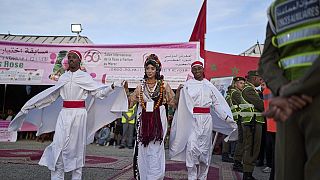Morocco
**If worldwide celebrations for the International women’s day are just around the corner. In Tamarwoute, Southwestern Morocco, it is not celebration time. Women’s rights activists like Najat Ikhich are still busy working. **
Najat Ikhich is tthe head of the YTTO rights group. An association which has been working for more than ten years to combat underage marriage. Ikhich leads a visit to the Berber-speaking village of Tamadghouste in south-western Morocco to raise awareness about the social issue and promote greater autonomy for the women living in the "marginalised" areas. She is preparing the annual convoy her association organizes through Morocco's remote communities. It will take off this summer. "This visit allows us to put together a list of villages and districts that we feel are marginalised and that need a lot of work, then come back for a second visit during which we name coordinators in these regions and agree on a final route for the convoy", she says.
It has been more than 10 years that YTTO volunteers drive through the winding roads of rural Morocco. When they tour small towns, they encounter the same obstacles: precarious livelihoods and long-held traditions, which can make their message inaudible. The country’s 2004 family code puts the legal age of marriage at 18, but it includes a clause allowing judges to give families special dispensation. And according to official figures, judges approved some 13,000 waivers in 2020 alone -- more than half of the total applications.
"Going through hell"
In the Souss Massa region, more than 44 percent of women are illiterate. A lack of education that hinders the development of skills and leaves marriage as the only token of stability. "Underage marriage in the countryside is due to many factors like poverty, marginalisation, a lack of infrastructureor the fact that young girls don't go school, Ikhich explains**. In towns and cities, it's caused by several conservative ideas originating from marginalised areas of places like Casablanca, Rabat, Fez, Marrakech, etc, which say that the place of a young girl is with her husband.**"
Nadia was just 16 when she was married off to a violent husband old enough to be her father -- an ordeal thousands of Moroccan girls face every year due to a legal loophole. "I went through hell. But the nightmare is behind me now," she said.
Nadia, from a remote part of the North African kingdom's Anti-Atlas mountains, managed to win a divorce after a year of marriage.
Now aged 20 and living back with her parents in her village of Tamarwoute, she is learning to read and write. "My dream is to be independent, and I'm encouraging other girls in the village to do the same," she said shyly, her face half-covered with a scarf.
Battle for autonomy
In the nearby village of Tamadghouste, among hills dotted with the region's famous argan trees, barely a soul was moving. A few young women were gathered baking bread at the communal oven.
Ikhich approached and exchanged a few words with them in Amazigh, Morocco's Berber language.
The women's suspicious looks soon gave way to a flood of complaints over living standards in a village that has neither a school nor a pharmacy. Amina, 23, said she was trying to "take control" of her life, after she was taken out of school at the age of six and married at 17.
"I've always wanted to study but nobody helped me. My three sisters had it even worse: they were married really young, at around 14 years old," she said. At the communal oven, the women discuss making carpets or selling traditional bread to nearby hotels as ways of making a living and winning some autonomy.
They agreed on one thing: all girls have the right to an education. When the YTTO convoy will take off next summer, Najat Ikhich and other volunteers will continue to raise awareness about the social issue of child marriage and promote greater autonomy for women.











Go to video
Moroccan museums open doors for free to inspire youth pride and cultural connection
Go to video
Women redefine Gnaoua at Essaouira Festival
01:15
Morocco says 2024 was the hottest year with temperatures reaching 47.7 degrees
Go to video
Morocco to reassess Turkey trade deal amid swelling deficit
01:10
Ghana ends support to Western Sahara, backs Moroccan autonomy plan instead
Go to video
Ghanaian citizens can now travel to Morocco without a visa